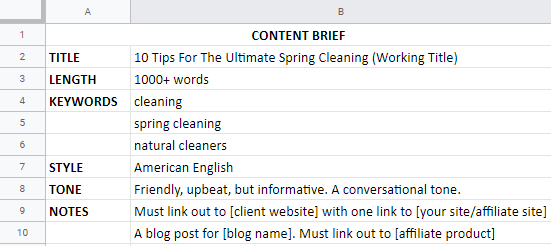“Consumers consult an average 14.8 pieces of information before making a buying decision.”
Ben Tyson, Google
So, you’ve secured some great affiliate products for your website. Now what? Affiliates need quality content to sell their products, and you need affiliates to make money.
But quality content isn’t easy to come by. Unless you’re a skilled writer, chances are your content is going to sound a lot like every other content out there: repetitive, overly salesy and vague.
Hiring a copywriter to your team is a good way to ensure professional-level content creation. But it can be expensive to hire one copywriter for the bulk of your content creation needs. And it can often lead to stale and overused copy. Hiring more than one writer means your costs only go up.
Many companies choose to outsource, cutting the costs and increasing their pool of writers to improve their chances of creating fresher and more dynamic content. It’s a great way of scaling your content creation if done right.

Outsourcing Doesn’t Have To Be A Bad Word
Having your own team means they’re your team. It means you set the brand style and tone, and everyone works together to ensure you get everything you want. Tempting, right? But keeping a team of copywriters, editors, and content creators can be expensive. And doing all the work yourself can risk a dip in quality when you get too busy, distracted, or run out of ideas.
Why Outsource?
When you’re working with affiliates, it’s not just about you, and your brand. It’s key that you can fit in with your affiliate’s needs, too. Doing the right research to score affiliates that match your own brand, and make a valuable partnership is important.
But so is having a flexible style, and keeping the content flowing. Outsourcing is often cheaper than an in-house copywriter and can give you variety in your voices, while still maintaining flexibility. With someone else coming up with content and worrying about style, you can focus on offering your affiliates high-quality service and tools like photos and video stock and cementing your relationships.
Finding & Hiring Writers
One of the tougher aspects of finding and keeping a freelance writer is the risk of quality control. Common ways of outsourcing your content creation workload include freelance job boards. These sites generally operate one of two ways: either through a bidding process or by being first in the queue. Beyond saving time and money, outsourcing content creation has plenty of benefits from your business.
But content job boards come with risks. Many of the writers are new and inexperienced. Generally, they don’t have marketing training, and may not be familiar with SEO marketing, or keyword research. That doesn’t have to be a bad thing! Writers are here to write, after all. The marketing is up to you.
A new writer comes with perks, including a willingness to learn, a certain trainability to your brand and its style conventions, and of course, an excellent price. There are a few things you can do to maintain quality control and ensure that you get the best these sites have to offer.
1. Check Out Profiles

Most freelance and content writing sites come with online portfolios, which can tell you about your writer’s background, topics of interest, education level, and writing samples. That allows you to get a feel for the level of work they’re capable of.
2. Offer Clear Briefs
We’ll talk about article briefs and SOPs later on, but it’s important to clarify your intentions when you’re writing. Present a topic and offer outline samples so a new writer can see your style and brand. Be specific about word counts, and mention if it’s a blog, ad copy, or product description.
3. Resist the Urge To Go Cheap
It’s amazing how cheap you can get decent content when you start looking. Many freelance job sites offer various tiers of content pricing. Stay away from lower-priced writers. It usually denotes inexperience. Experienced writers know their worth. To keep them motivated, tipping or bonuses can set you apart as a client sought out by high-quality freelancers.
4. Keep Expectations Reasonable
Remember, freelance content writing isn’t a typing job. For the best quality, you’re going to want to give plenty of time to do the research, come up with the idea, write and proof it. Check-in with your article writers when they’re hired and be on hand to answer questions if they have them. Learn to spot problems before they start so you can maintain a positive relationship with quality writers and recognize when to let the others go.
Setting up a content management system
Your content management system dictates the way users interact with your content. That makes it important for your affiliates that you can quickly and easily create, edit, and organize your pages. If your readers can’t find what they’re looking for, you lose sales, and your affiliates lose faith.

Your content management system should be able to address the following concerns:
- Core functionality: How fast and easy is it to edit and reorganize pages?
- Search functions: Does your search index the entire content of each page? Can you rank results? What are your customization options?
- Other customization aspects: Can you present your content in a variety of ways? Do you have the flexibility to mix pictures and embedded video? Can you display events in a calendar? Do you have the flexibility to highlight user comments on your home page?
- User Interaction: Can you gather user feedback using a third-party plugin? Can you communicate via social media from our homepage, or display social media feeds? Can you create popups for signup to a newsletter or ads for an online tutorial? And (important for affiliate marketing) can you track engagement data to improve your leads, and increase sales?
- Roles and Permissions: If you’re involved in an affiliate marketing program, and looking to outsource content creation, your CMS needs to be able to handle multiple roles, without compromising security. How many roles can your CMS support? What security features and tech support options are available for your team?
These are just a few of the considerations for your content managing system. Flexibility and security are key to keeping your affiliate program benefiting both you and your affiliates. The ability to track user and customer data will also help keep you pushing the right products to the right readers.
Crafting The Perfect Brief
With your content management system optimized to include each member of your team, and your network expanded to include top writers from the best that freelance job boards have to offer, now is the time to focus on scaling content. And even the best writers are only as good as the instructions they’re given.
As we’ve seen, there are many potential problems with freelance writers. But the right brief can help good writers become great, and keep great writers working with you, rather than for you.
Follow these tips when crafting the perfect brief:
- Keep it simple
Stay away from lengthy descriptions of what you need in your content. If you’ve got sample articles, use them, but make sure they’re short. Writers want to follow instructions, but they’re in a creative business. They can’t simply input data into a formula and come out with sparkling content. - Remember Your Goals
Mention the purpose of the content you want to be written. Product descriptions read differently from newsletters or blog posts. Be clear with your objectives, and the writer will get to the point. - Keywords
Provide a list of keywords but stay flexible. Understand that natural writing will read better, and SEO is not in the writer’s job description. - Length
Be clear in the length you’re looking for and prepare for a 100-word window on either side. - Audience
Mention the target audience and note the experience or expertise level you’re looking for. Do not mention “perfect spelling, perfect grammar, native English speakers only.” A professional writer knows how to cover the basics, and this is a sure-fire way to point out a difficult client.
We’ve provided a sample brief below:

When you’re just starting out, it might be a good idea to provide article samples that match the tone and style you’re looking for or suggest headings to provide structure. You can also add technical specs, like, where you want headings or other links you need.
Try to stay away from formatting tips unless they’re really specific. Asking a writer to add 3 headings to an article is reasonable. Asking them to remember to use HTML in their headings is something you will likely need to do yourself.
Training & Managing Writers
Speaking of what you need to do yourself. Now that you have mastered finding the right writers for your team, how do you keep them and teach them the ins and outs of your brand and its objectives?
A lot of the trick to managing and training writers is things we’ve already covered. Provide clear briefs, with clear objectives. Communicate your needs. Don’t have unrealistic expectations if you’re not willing to pay time and money for them. These are important principles. But there are a few more things to consider when hiring a freelance writer.
1. You Are Responsible For The Quality of Content
No matter how good the writer, that content is your responsibility. You’ve made a deal with your affiliates, and that relationship is yours to maintain. Always check your writer’s work for errors and omissions. Make sure links aren’t broken, and there are no formatting issues in your final copy.
2. Know When To Send A Copy Back
Rewrites take time, and the goal of outsourcing is to save yours. Skim your writer’s work and make note of big or small changes that need to be done. If it’s a matter of cutting it down or swapping a few sentences, it may be faster to rewrite yourself. If it’s a bigger job, provide detailed notes for the rewrite before ordering, so your writer knows exactly what you’re looking for.
3. Keep an Open Line of Communication
Like your affiliates, your freelancers should be considered a relationship more than a stream of revenue, or content. Keeping an open line of communication is more than just providing notes when a rewrite is needed. Feedback can be helpful even when it’s positive and building a relationship with your writers keeps you informed of schedule and workload changes that could impact your content.
4. Reward Your Writers
Most freelance sites offer opportunities for tips, but even leaving positive reviews or referrals can show your appreciation for a talented member of your team. You don’t need to shower a copywriter with gifts or praise to retain loyalty or ensure a good work ethic. But showing your appreciation is sure to be noticed by your top performers, which means they’re more likely to be available when you have work for them!

Wrapping Up
There are plenty of reasons to shy away from outsourcing content creation. Quality control and lack of creative direction are just two of them. But your website and your affiliate partners need high-quality content to drive traffic, and hiring a professional writer gives you better options for the content you need. Outsourcing comes with challenges, but with the right planning, you can find and create relationships with talented writers at a fraction of the cost of an in-house copywriter. You’ll also get variety and creativity, and, with the right guidance, a consistent brand voice across the board, that meets your needs, and those of your affiliate partners.
Share this article
How To Find Affiliates to Sell Your Products
Discover over 10 successful strategies for finding high-quality affiliates in 2024 to boost your product sales. Learn to leverage influencers, join affiliate networks, and enhance your reach through SEO and social media. Maximize revenue with transparency and ongoing monitoring in your affiliate marketing program.
Affiliate marketing email templates
Discover expertly crafted email templates for affiliate marketing with Post Affiliate Pro. Enhance your communication by motivating, acknowledging, and engaging affiliates effectively. From terms and conditions to product launches, these templates ensure clear and consistent messaging to boost your affiliate program's success. Visit now to streamline your affiliate communication!
How to keep your affiliates happy with split commissions
Discover how Post Affiliate Pro's SplitCommission™ feature can boost affiliate motivation and engagement by fairly distributing commissions among all contributors to a sale. Learn how to implement this innovative model to enhance your affiliate program's success.










